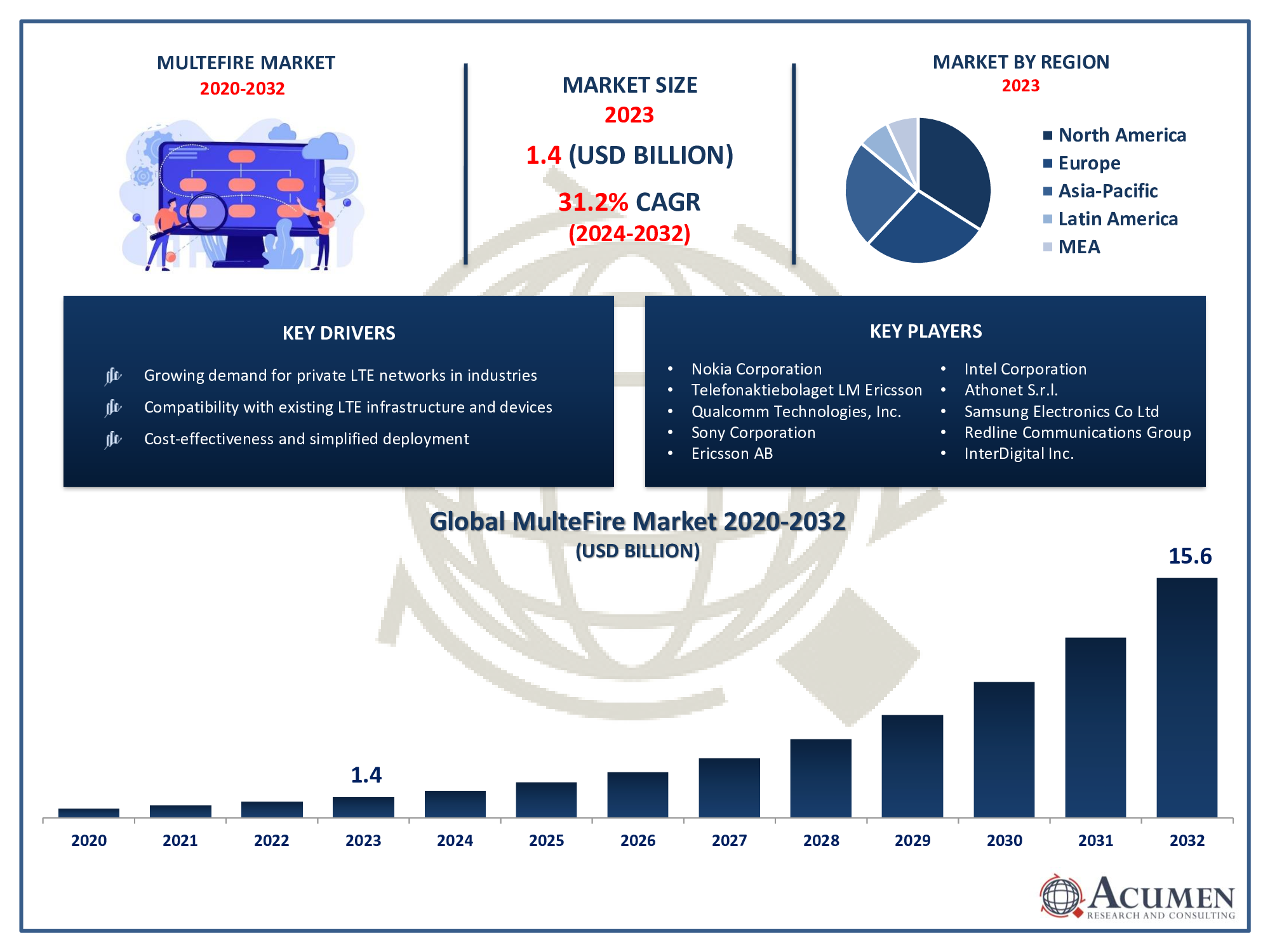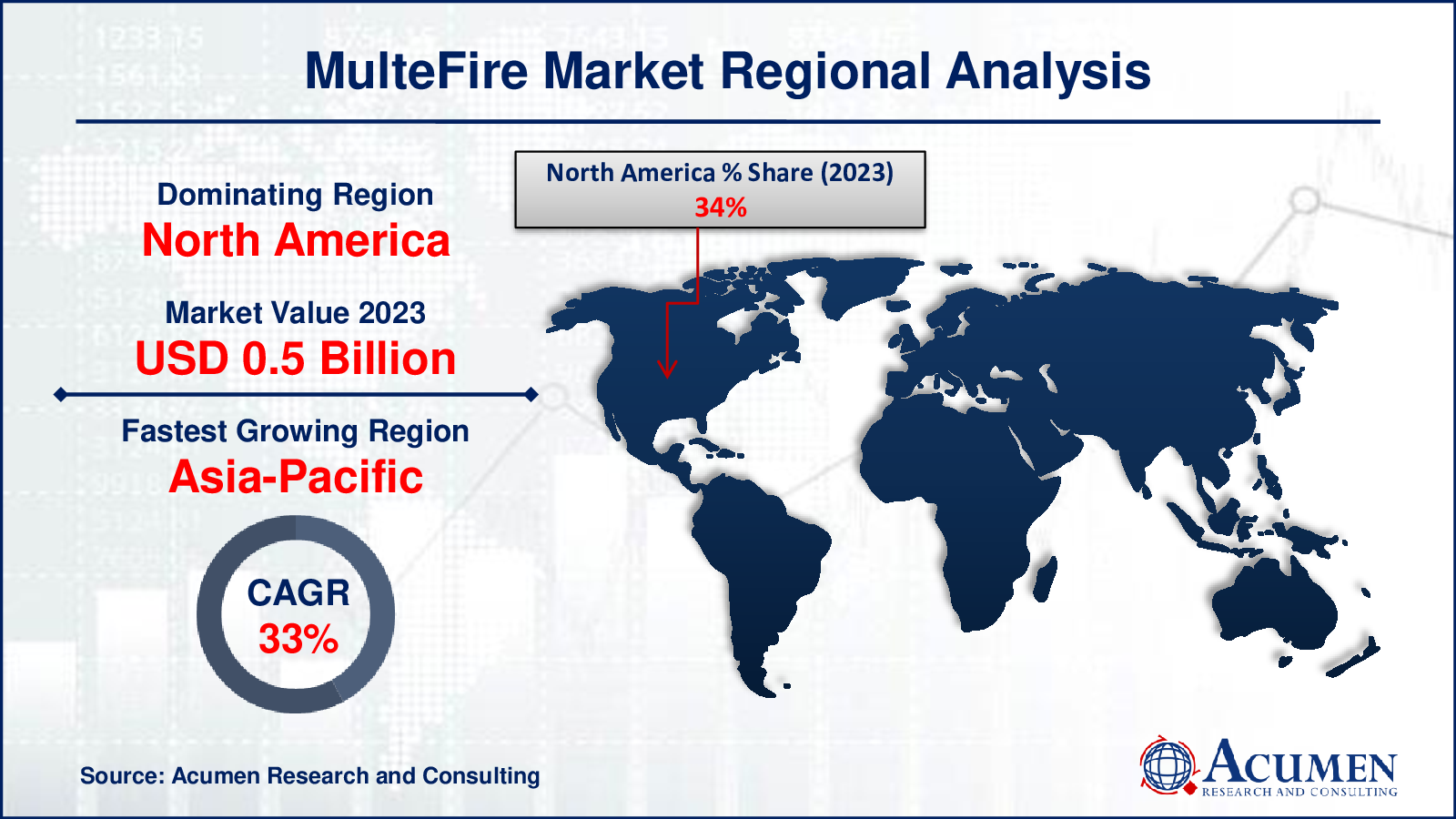MulteFire Market Size - Global Industry, Share, Analysis, Trends and Forecast 2024 - 2032
Published :
Report ID:
Pages :
Format :
MulteFire Market Size - Global Industry, Share, Analysis, Trends and Forecast 2024 - 2032
Report Coverage
- Industry Dynamics
- Market Size and Forecast Data
- Segment Analysis
- Competitive Landscape
- Regional Analysis with a Niche Focus on Country-Level Data
- High Level Analysis - Porter's, PESTEL, Value Chain, etc.
- Company Profiles of Key Players
- Option to Customize the Report As Per Your Specific Need
Request Sample Report
The Global MulteFire Market Size accounted for USD 1.4 Billion in 2023 and is projected to achieve a market size of USD 15.6 Billion by 2032 growing at a CAGR of 31.2% from 2024 to 2032.
MulteFire Market Highlights
- Global MulteFire market revenue is expected to increase by USD 15.6 Billion by 2032, with a 31.2% CAGR from 2024 to 2032
- North America region led with more than 34% of MulteFire market share in 2023
- Asia-Pacific MulteFire market growth will record a CAGR of more than 33% from 2024 to 2032
- By device, the small cells are the largest segment of the market, accounting for over 41% of the global market share
- By end user vertical, industrial manufacturing is one of the largest and fastest-growing segments of the MulteFire industry
- Growing demand for private LTE networks in industries, drives the MulteFire market value

MulteFire is a wireless communication technology that operates in unlicensed spectrum, combining the benefits of LTE (Long-Term Evolution) with the flexibility of Wi-Fi. It allows for standalone operation in unlicensed or shared spectrum, enabling private LTE networks without the need for licensed spectrum or a licensed mobile network operator. This makes it an attractive option for various industries, including manufacturing, transportation, and utilities, seeking to deploy high-performance wireless networks for their specific needs without relying on traditional carriers.
The market growth of MulteFire has been promising, fueled by the increasing demand for reliable, high-capacity wireless connectivity in various sectors. With its ability to provide dedicated, secure, and high-performance connectivity, MulteFire has found applications in industrial IoT (Internet of Things), smart cities, and enterprise networks. As more industries recognize the benefits of private LTE networks, the adoption of MulteFire is expected to grow steadily. Additionally, its compatibility with existing LTE infrastructure and devices facilitates seamless integration and deployment, further driving its market expansion. Moreover, MulteFire's versatility extends beyond traditional wireless networks, offering opportunities for innovative use cases such as neutral host networks and private campus networks.
Global MulteFire Market Trends
Market Drivers
- Growing demand for private LTE networks in industries
- Compatibility with existing LTE infrastructure and devices
- Cost-effectiveness and simplified deployment
- Versatility for innovative use cases such as neutral host networks
- Enhanced security and reliability compared to traditional Wi-Fi
Market Restraints
- Regulatory challenges related to unlicensed spectrum use
- Initial infrastructure investment and deployment costs
Market Opportunities
- Expansion of IoT applications in industrial and enterprise sectors
- Integration with emerging technologies like edge computing
MulteFire Market Report Coverage
| Market | MulteFire Market |
| MulteFire Market Size 2022 |
USD 1.4 Billion |
| MulteFire Market Forecast 2032 | USD 15.6 Billion |
| MulteFire Market CAGR During 2023 - 2032 | 31.2% |
| MulteFire Market Analysis Period | 2020 - 2032 |
| MulteFire Market Base Year |
2022 |
| MulteFire Market Forecast Data | 2023 - 2032 |
| Segments Covered | By Device, By End User Vertical, And By Geography |
| Regional Scope | North America, Europe, Asia Pacific, Latin America, and Middle East & Africa |
| Key Companies Profiled | Nokia Corporation, Telefonaktiebolaget LM Ericsson, Qualcomm Technologies, Inc., Sony Corporation, Ericsson AB, Intel Corporation, AthonetS.r.l., Samsung Electronics Co Ltd, Redline Communications Group, InterDigital Inc., Huawei Technology Co. LTD., and Casa Systems, Inc. |
| Report Coverage |
Market Trends, Drivers, Restraints, Competitive Analysis, Player Profiling, Covid-19 Analysis, Regulation Analysis |
Unlike traditional LTE, which typically requires licensed spectrum and a licensed mobile network operator, MulteFire enables standalone operation in unlicensed or shared spectrum bands. This means that organizations can deploy private LTE networks without needing to rely on traditional carriers or acquire expensive spectrum licenses, making it particularly attractive for industries looking to establish their own high-performance wireless networks. The applications of MulteFire span across various sectors, driven by its ability to provide dedicated, secure, and high-capacity connectivity. In industrial settings, MulteFire facilitates the deployment of robust wireless networks for monitoring and controlling machinery, optimizing processes, and enabling real-time data analytics, thereby enhancing efficiency and productivity. In smart cities, MulteFire supports applications such as intelligent transportation systems, smart grids, and public safety networks, enabling seamless connectivity and communication among IoT devices, sensors, and infrastructure.
The MulteFire market has been experiencing steady growth driven by the increasing demand for private LTE networks across various industries. With its ability to operate in unlicensed spectrum and provide standalone connectivity, MulteFire offers a compelling solution for organizations seeking reliable and high-performance wireless networks without relying on traditional mobile carriers. Industries such as manufacturing, transportation, and utilities are leveraging MulteFire to deploy dedicated networks tailored to their specific needs, driving the adoption of this technology. Moreover, the compatibility of MulteFire with existing LTE infrastructure and devices facilitates seamless integration and deployment, further fueling its market growth. This compatibility reduces the barriers to entry for organizations already invested in LTE technology, making it easier for them to transition to MulteFire-based solutions. Additionally, the cost-effectiveness and simplified deployment of MulteFire networks contribute to its market expansion, attracting organizations looking to enhance their wireless infrastructure without incurring significant upfront costs or complexity.
MulteFire Market Segmentation
The global MulteFire market segmentation is based on device, end user vertical, and geography.
MulteFire Market By Device
- Small Cells
- Controllers
- Switches
In terms of devices, the small cells segment accounted for the largest market share in 2023. Small cells are compact wireless access points that enhance network coverage and capacity in densely populated areas or areas with high data traffic. In the context of MulteFire, small cells offer a cost-effective solution for deploying private LTE networks in localized environments such as office buildings, campuses, stadiums, and urban centers. As organizations seek to improve indoor and outdoor coverage and capacity, the demand for small cell solutions compatible with MulteFire technology has surged. One significant driver of growth in the small cells segment is the increasing adoption of MulteFire for private LTE networks across various industries. Small cells play a crucial role in extending the coverage and capacity of these networks, especially in indoor environments where traditional macrocell deployments may be insufficient. The ability of small cells to provide targeted coverage and capacity enhancements makes them well-suited for scenarios where localized network optimization is required, driving their integration into MulteFire-based solutions.
MulteFire Market By End User Vertical
- Industrial Manufacturing
- Transportation and Logistics
- Commercial
- Education
- Retail and Hospitality
- Healthcare
- Public Venues
- Others
According to the MulteFire market forecast, the industrial manufacturing segment is expected to witness significant growth in the coming years. Industrial manufacturers are turning to private LTE networks based on MulteFire technology to address their unique connectivity requirements, such as low latency, high reliability, and seamless mobility. These networks enable real-time monitoring, control, and optimization of manufacturing operations, leading to improved efficiency, productivity, and safety. As manufacturers embrace Industry 4.0 initiatives and deploy IoT devices, robotics, and AI-driven systems, the demand for robust and secure wireless connectivity solutions like MulteFire continues to escalate. One key driver of growth in the industrial manufacturing segment is the need for dedicated and mission-critical communication networks that can operate reliably in challenging industrial environments. MulteFire's ability to provide standalone connectivity in unlicensed spectrum makes it an attractive option for manufacturers seeking to deploy private LTE networks without reliance on external operators or licensed spectrum. By leveraging MulteFire technology, industrial manufacturers can establish resilient and scalable wireless networks tailored to their specific operational requirements, such as real-time monitoring of machinery, asset tracking, and worker safety applications.
MulteFire Market Regional Outlook
North America
- U.S.
- Canada
Europe
- U.K.
- Germany
- France
- Spain
- Rest of Europe
Asia-Pacific
- India
- Japan
- China
- Australia
- South Korea
- Rest of Asia-Pacific
Latin America
- Brazil
- Mexico
- Rest of Latin America
The Middle East & Africa
- South Africa
- GCC Countries
- Rest of the Middle East & Africa (ME&A)

MulteFire Market Regional Analysis
North America stands out as a dominant region in the MulteFire market due to several key factors driving its adoption and growth. North America boasts a robust ecosystem of technology companies, solution providers, and enterprises at the forefront of digital innovation. This ecosystem fosters a conducive environment for the development and deployment of advanced wireless technologies like MulteFire. With a strong focus on industries such as manufacturing, healthcare, transportation, and logistics, North American enterprises are actively seeking cutting-edge connectivity solutions to enhance productivity, efficiency, and competitiveness, thus driving the demand for MulteFire networks. Moreover, regulatory frameworks in North America are often conducive to the adoption of innovative wireless technologies. The Federal Communications Commission (FCC) in the United States, for example, has been supportive of initiatives aimed at expanding access to unlicensed spectrum and promoting the deployment of private wireless networks. MulteFire's ability to operate in unlicensed spectrum aligns well with such regulatory trends, making it an attractive option for organizations looking to deploy private LTE networks without the need for licensed spectrum or reliance on traditional mobile carriers. This regulatory support contributes to the accelerated adoption of MulteFire in North America.
MulteFire Market Player
Some of the top MulteFire market companies offered in the professional report include Nokia Corporation, Telefonaktiebolaget LM Ericsson, Qualcomm Technologies, Inc., Sony Corporation, Ericsson AB, Intel Corporation, AthonetS.r.l., Samsung Electronics Co Ltd, Redline Communications Group, InterDigital Inc., Huawei Technology Co. LTD., and Casa Systems, Inc.
Frequently Asked Questions
What was the market size of the global MulteFire in 2023?
The market size of MulteFire was USD 1.4 Billion in 2023.
What is the CAGR of the global MulteFire market from 2024 to 2032?
The CAGR of MulteFire is 31.2% during the analysis period of 2024 to 2032.
Which are the key players in the MulteFire market?
The key players operating in the global market are including Nokia Corporation, Telefonaktiebolaget LM Ericsson, Qualcomm Technologies, Inc., Sony Corporation, Ericsson AB, Intel Corporation, AthonetS.r.l., Samsung Electronics Co Ltd, Redline Communications Group, InterDigital Inc., Huawei Technology Co. LTD., and Casa Systems, Inc.
Which region dominated the global MulteFire market share?
North America held the dominating position in MulteFire industry during the analysis period of 2024 to 2032.
Which region registered fastest CAGR from 2024 to 2032?
Asia-Pacific region exhibited fastest growing CAGR for market of MulteFire during the analysis period of 2024 to 2032.
What are the current trends and dynamics in the global MulteFire industry?
The current trends and dynamics in the MulteFire market growth include growing demand for private LTE networks in industries, compatibility with existing LTE infrastructure and devices, and cost-effectiveness and simplified deployment.
Which device held the maximum share in 2023?
The small cells device held the maximum share of the MulteFire industry.



